After being diagnosed with cancer in 1988, Forrest Fenn, a retired Air Force Pilot and gallery owner, was inspired to hide a treasure chest in the Rocky Mountains of the United States. It is to this treasure chest that’s filled, supposedly, with jewels and gold, that this poem leads. Fenn intended for the treasure to inspire a public search. He claims that the treasure is hidden in a medieval bronze box featuring relief scenes of knights and maidens with flowers.
The search is detailed in a memoir he self-published in 2010 titled, The Thrill of the Chase: A Memoir. In it, Fenn tells stories from his life which supposedly also contain clues to the location of the gold. It’s in the chapter “Gold and More” that this poem is found. In the six stanzas of this poem, there are supposedly nine clues that together will lead a searcher to the buried treasure.
The story, book, and poem have inspired a search for the treasure across four states through which the Rocky Mountains reach. Since the book was published and Fenn began speaking about the treasure, five people have died while searching for it. Additionally, there are have several controversies related to the treasure. These include arrests for digging in state parks and lawsuits against Forrest Fenn.
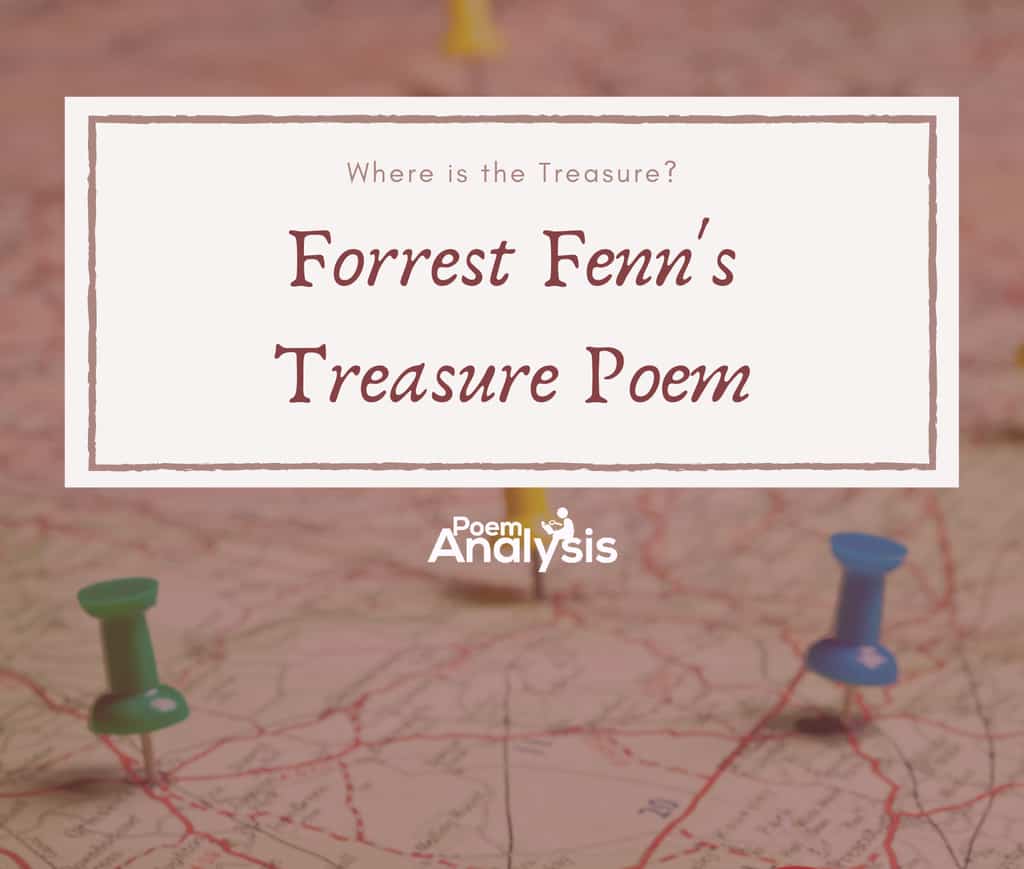
Table of Contents
Structure of the Forrest Fenn’s Treasure Poem
The Treasure Poem by Forrest Fenn is a six stanza poem that follows a simple rhyme scheme. This is something that should be taken into consideration when unpacking what might be a beneficial clue what might simply be a rhyming word. There are in total, supposedly, nine clues hidden within the six stanzas. This can be thought of in several different ways. First, that each sforrentence is a clue. There are a total of nine sentences in the poem but some seem to be much more important than others.
The first stanza is a single sentence and is supposedly one of the least important stanzas of Forrest Fenn’s Treasure Poem. The second speaks of “warm waters” a “canyon” and walking. In the third sentence, Fenn discusses the “Home of Brown” which is undoubtedly important. Then the fourth sentence mentions words like “Meek” and “loads” which are likely part of a clue.
The fifth sentence is about the blaze and how fast one must look for the treasure. The six mentions the unusual word “trove”. In the eighth Fenn speaks of listening closely to his words and it being “worth the cold”. Then, in the final sentence, he uses the word “brave” and says that you have to be “in the wood”.
Alternatively, one might consider the nine clues as going from start to finish, beginning with the word “Begin” in the second stanza. This leads one to the canyon down that’s too far to walk. Then, onto the home of brown and no place for the meek. Next, there is the end which is coming closer and the creek up which one can’t go with a paddle. Then there are the waters, the heavy loads and the blaze. Finally, the ninth clue is to move quickly down.
Analysis of the Forrest Fenn’s Treasure Poem
Stanza One
As I have gone alone in there
And with my treasures bold,
I can keep my secret where,
And hint of riches new and old.
In the first stanza of the Forrest Fenn’s Treasure Poem, the speaker, who is Forrest Fenn, begins by describing his treasure and the initial process of hiding it. The first stanza is commonly believed to be less important than the second or third, but its existence at all makes it necessary to consider. These lines might also contain some hint as to which “warm waters,” mentioned in the second stanza, one should start at.
The first line references travelling somewhere alone. Fenn was supposedly alone when he buried the treasure and perhaps he was thinking while writing that the person who found his treasure would be too. Or, maybe the word is hinting at the location being a lonely one. It could be a solitary natural element like a peak or outcropping.
He speaks in the second line of this being a “bold” act, or of his treasures as a “bold” thing to possess or find. It could be that the steps he took to hid it were “bold,” perhaps there was something risky about what he did, despite his age or due to it. The word “bold” might also refer to the name of an element of the landscape.
The third line is very vague, as is the fourth. It reads very much like a line added to rhyme with “there” at the end of the first line. The “riches” are spoken of as “new and old” in the fourth line. Again, very vague. There is not much to go on here. Perhaps there is some “old” yet still valuable in the place where he hid the treasure. Some have drawn connections between this line and Fenn’s past as an acquirer, and some would say, thief, of Native American art and artifacts.
Stanza Two
Begin it where warm waters halt
And take it in the canyon down,
Not far, but too far to walk.
Put in below the home of Brown.
Fenn has hinted at the fact that searchers should begin with the phrase “Begin it”. It is the first clue in the poem. This is why the first stanza is often ignored. The first phrase alludes to a place where “warm water’s halt”. This is often taken to mean a hot spring, maybe the last in a series or the last place where one can find warm waters before descending down into a canyon.
Water is one of the most important images in this poem, made even more so by Fenn’s assertion that the treasure is “wet”. Searchers are meant to take the canyon down, maybe by boat or car as it is “too far to walk”. But, it isn’t that far. It is important to keep in mind Fenn’s age when he hid the treasure. It wouldn’t have been possible for him to hike tens of miles into the backcountry.
One of the most interesting hints in the poem, “below the home of Brown” is in the fourth stanza. Could this be a real home of someone named Brown? A building that looks brown? The home of something that is brown? Forrest Fenn is quoted as saying that the “brown” clue is one of the most important. If one can decipher what it is referring to, the treasure is within reach.
As with the other stanzas, connections can be made with both locations and names. For example, canyons like “Downtown Canyon or “south Canyon” have been mentioned in regards to the second line. The word “Brown” has spawned the consideration of places like Brown Mountain Campground and Browns Canyon National Monument in Colorado. The former is connected to one of the most promising locations, Kirwin, Wyoming.
Stanza Three
From there it’s no place for the meek,
The end is ever drawing nigh;
There’ll be no paddle up your creek,
Just heavy loads and water high.
The third stanza is also considered to be quite important. It alludes to something dangerous (perhaps) about the location. It is “no place for the meek”. But, this by no means is clear cut. It could refer to a place name or the name of a person like Joe Meek who was run off by Blackfoot Native Americans. This is one of the more promising connections in Yellowstone National Park. He wandered off and ended up discovering a hot spring. This connects back to the second stanza as it is the last hot spring at the base of Cinnabar (brown colour) Mountain. There are also connections to Sphinx, Montana and a specific creek that runs through lands that also relate to this stanza.
The next lines refer to “your creek,” another mystery that includes the searcher in the poem. A reader might also interpret these lines to refer to a waterfall. This makes sense with the last line of the stanza and the reference to “water high”. There is something about the creek that leads there that is difficult. There will be “no paddle up your creek”. Is it impossible to paddle up?
Stanza Four
If you’ve been wise and found the blaze,
Look quickly down, your quest to cease,
But tarry scant with marvel gaze,
Just take the chest and go in peace.
The fourth stanza of Forrest Fenn’s Treasure Poem alludes to the end of the quest. While travelling along this river “you” have to be looking for a blaze. This immediately connects to trail blazes but nothing is quite that simple or the treasure would already have been found. Fenn has alluded to the “blaze” as something solid that one can’t remove. It is something permanent that one would be unable to tamper with. Other clues from Fenn include its colour. He has stated that it’s white, such as a rock or tree, something impossible to carry away. There might be other connections to events, place names, and people.
Once you find that place then you have to quickly look down and it’ll be there, the quest will be over. It is below the surface of the water and if you waste time you won’t be able to grab it or see it.
This stanza provides what appears to be the last most important clues of the poem. As with the other sections, these lines would appear less vague and mysterious if one were in the right location.
Stanza Five
So why is it that I must go
And leave my trove for all to seek?
The answers I already know,
I’ve done it tired, and now I’m weak.
Fenn asks a question in the first lines of this stanza. The word “trove” sticks out as an alternative to treasure. As usual, the word “trove” might relate to a place name or a person. It could also speak to the nature of the hiding place.
The last line “I’ve done it tired and now I’m weak” might contain some clue as to the location of the hiding place. It could reference the effort it took for him to get there and get back or the words “tired” and “weak” might have an alternative meaning entirely.
Stanza Six
So hear me all and listen good,
Your effort will be worth the cold.
If you are brave and in the wood
I give you title to the gold.
The sixth stanza acts as a conclusion to the previous five but that doesn’t mean that it should be disregarded. The first lines draw the reader’s attention, perhaps for the last clue. There are also place names that are connected to listening and hearing.
In the second line, he refers to the “cold”. This is most obviously related, (possibly), to the cold of the water one has to reach into to get the gold. The last lines speak of the woods and of bravery. Some believe the word “brave” might relate to a Native American brave rather than to the act of bravery. The word “wood” is also interesting. It could refer to a river of that name.
We asked three of our writers, who have interesting takes, following the analysis, where they think Forrest Fenn’s treasure is:
- Emma (poetry expert and author to this analysis)
- LJ (poetry expert and actor who portrayed a pirate, and therefore knows a bit about treasure)
- Jack’s thoughts on where the (poetry expert on Poem Analysis):
Forrest Fenn Treasure Found
On the 6th June, according to Forrest Fenn’s official website, Forrest Fenn’s treasure had finally been found.
Forrest Fenn stated:
It was under a canopy of stars in the lush, forested vegetation of the Rocky Mountains and had not moved from the spot where I hid it more than 10 years ago. I do not know the person who found it, but the poem in my book led him to the precise spot. I congratulate the thousands of people who participated in the search and hope they will continue to be drawn by the promise of other discoveries. So the search is over.
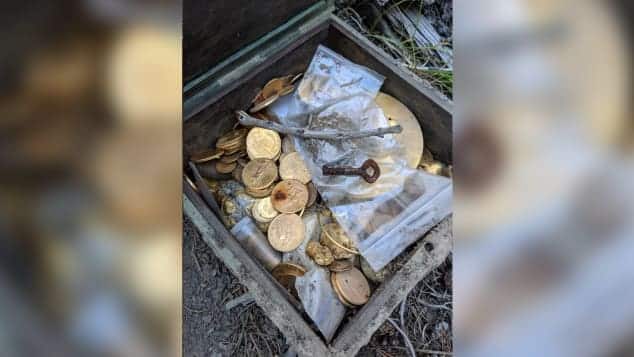
Did Poem Analysis Contribute to the Treasure being found?
At Poem Analysis, we are over the moon one lucky explorer has finally found Forrest Fenn’s treasure. However, it did make us wonder…
Did we help the explorer find the treasure?
Here’s what we know so far:
- We have a dedicated team of poetry experts, that have analyzed over 4,480 from 1106 different poets. We like to think our team knows a thing or two about poetry!
- Three members of our team, taking into consideration their poetry expertise and experience, made educational guesses as to where the treasure was located.
- We published this article on the 15th May 2020, 22 days before Forrest Fenn releases news of the treasure being found.
- As soon as we published our article, we ranked top spot for some crucial search phrases relating to the poem.
- “forrest fenn poem analysis”
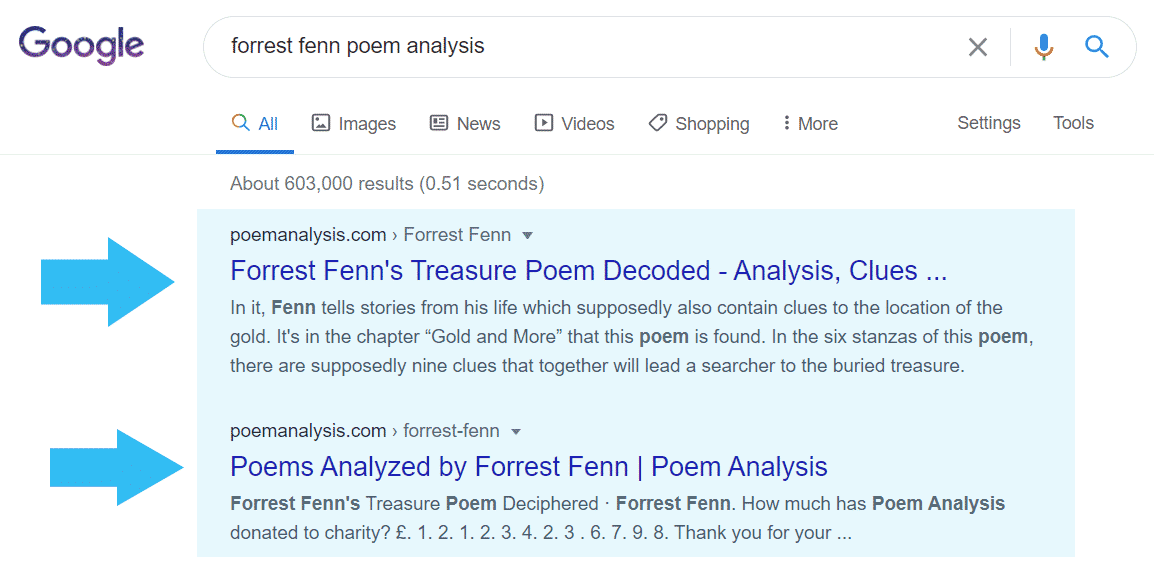
- “forrest fenn poem meaning”
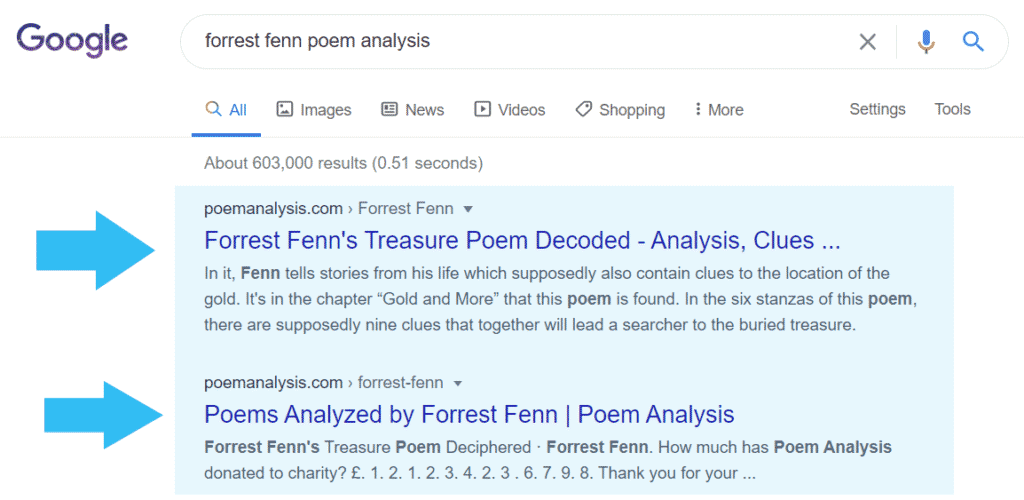
- “forrest fenn poem deciphered”
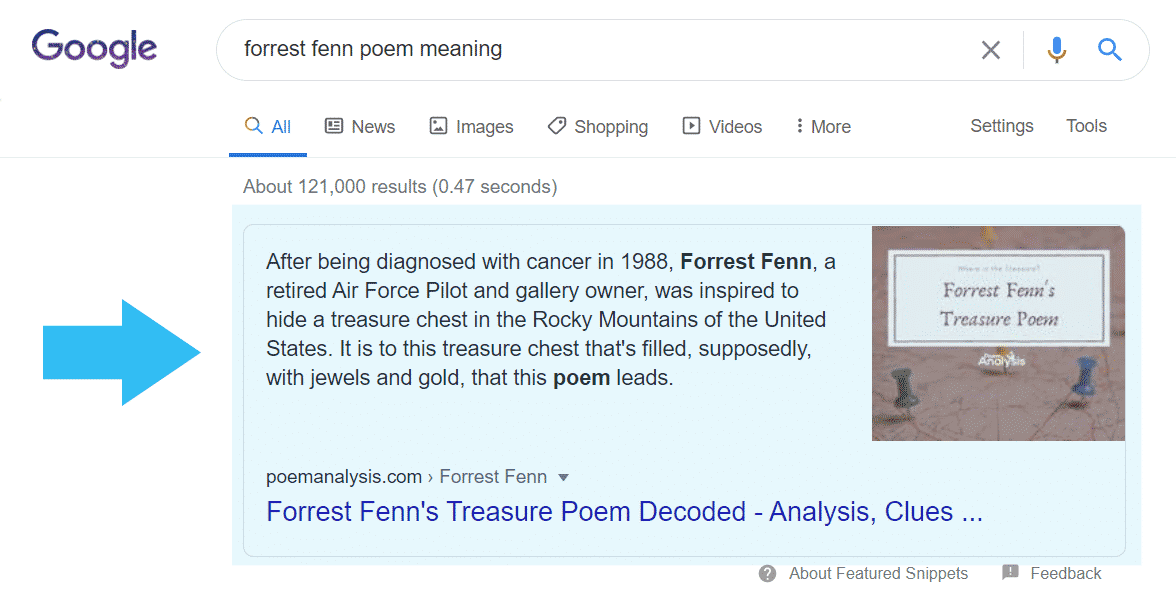
- “forrest fenn poem analysis”
We cannot confirm definitively that our article helped find the treasure. However, putting the crosses together, that we analyze thousands of poems, contributed with three objective guesses from our team where the treasure was, ranked highly for people to see the article, and the treasure was found a mere 22 days later, when it had not been found for over 10 years, it could suggest our analysis helped!
An important point to remember is that Forrest Fenn’s treasure map gave people the opportunity to explore the wilderness. Reconnect with nature and have an adventure with friends and family. Although there was a treasure that was found, it does question, ‘what is the real treasure?’ Is it materialistic things such as the actual treasure, or is it the journey?
Congratulations to whoever found the treasure – @Forrest Fenn, we are ready with your next challenge!








































